Rooney sparkles in midfield role: 5 things from Everton 1-2 Manchester United
FFT's Chris Flanagan was in the press box at Wembley to analyse Manchester United's FA Cup semi final victory over Everton...
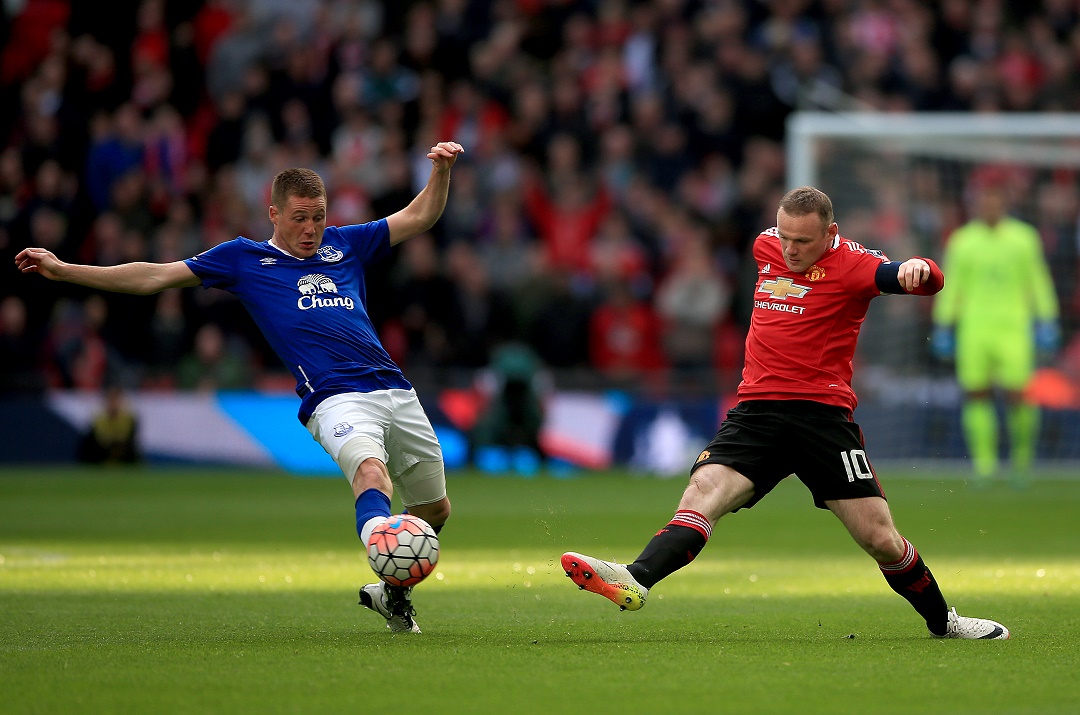
1. Rooney was key to victory
Romelu Lukaku could have been forgiven for doing a double take when he spotted the identity of the Manchester United player wrapped around his own post just five minutes into this game.
That guy who had just prevented Lukaku's goalbound effort from finding the net, the last line of a momentarily bedraggled United defence – was that Wayne Rooney? How did he get there?
The man who broke England's goalscoring record at this ground seven months earlier, now a heroic goal-line clearance maker too
Indeed, it was Rooney. The man who broke England's goalscoring record at this ground seven months earlier, now a heroic goal-line clearance maker too. Even the man himself couldn't have predicted that this would be the reason United fans were singing his name so early into this FA Cup semi-final.
But it summed up Rooney's performance – a performance that played a major part in United reaching the final on May 21, and a performance that puts him one game away from claiming the first FA Cup winner's medal of his career. At club level, he's won pretty much everything else.
Rooney's inclusion was the only change Van Gaal made to the side that won 2-1 in a quarter-final replay at West Ham United 10 days before this semi-final. He was a substitute feeling his way back from injury then. When fully fit, Rooney plays.
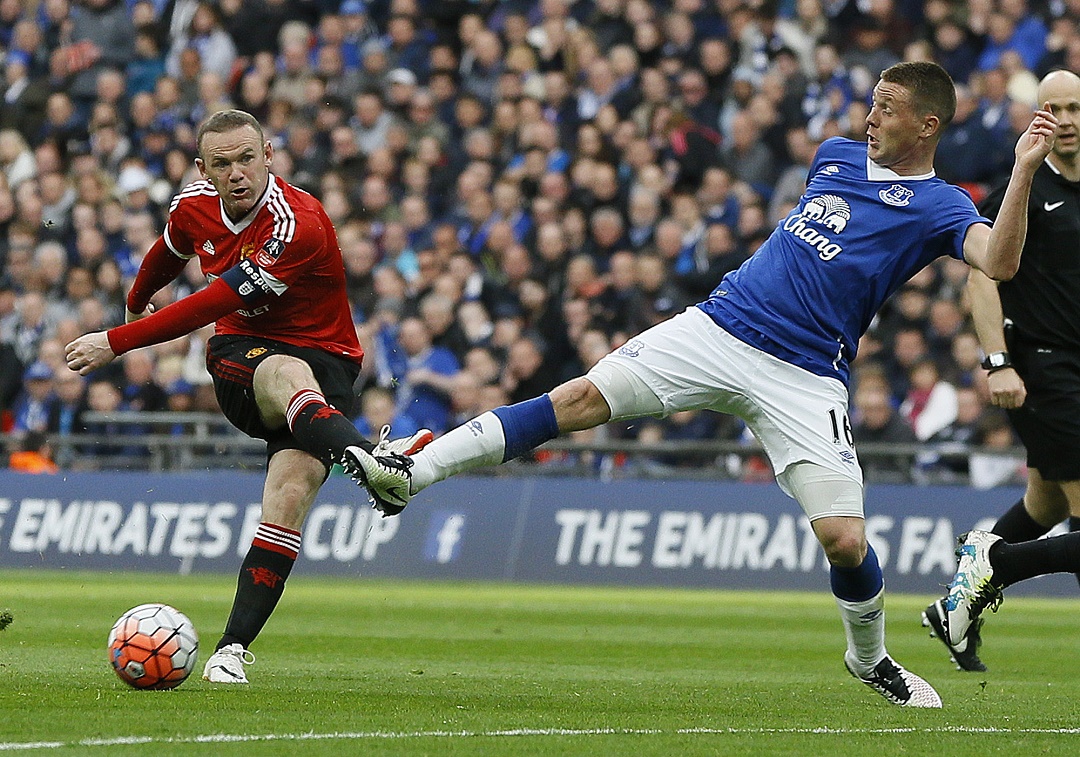
Where he plays is a different matter. Striker, wideman, even holding midfielder, Rooney has done it all over the last year or two. This time he was employed as an attacking midfielder alongside Marouane Fellaini, in front of Michael Carrick, but some way behind Marcus Rashford. Rooney ran the show for United, particularly in the first half.
Get FourFourTwo Newsletter
The best features, fun and footballing quizzes, straight to your inbox every week.
Not in an explosive, high-energy sort of way, as he has done in the past, but in a more measured, intelligent fashion. One person on Twitter even described him as 'a hairless Pirlo'. That might have been stretching it a bit – Rooney certainly wasn't playing as deep as Pirlo has done in recent years – but it was a wily sort of display that made full use of his experience, just like the Italian has always done.
One person on Twitter even described him as 'a hairless Pirlo'
It was Rooney that started many attacks, bringing Anthony Martial and Jesse Lingard into play. One particularly exquisite pass played in Lingard, only for Joel Robles to save. With Rashford now a key part of the United attack, this looks like being Rooney's role for the time being.
"At this moment I think that Rashford does a very good job in the striker's position and now Wayne can contribute more for the team in midfield," Van Gaal said afterwards when asked about Rooney's impressive performance. "I have seen today a great Wayne in midfield. It's the not the first time he played there, he played there last season and then your colleagues wrote that he has to play in the striker's position..."
2. Are left-footers worse at penalties?
Yesterday twenty penalties, Sergio Romero stopped one, David de Gea none. But today was the most important
"I don't trust left-footed penalty takers," former Newcastle full back Warren Barton once oddly commented after watching a penalty shootout between Everton and Chelsea, in which Leighton Baines and Ashley Cole had both missed. It seemed a rather bizarre theory. After all, why should left-footed penalty takers be any worse than right-footed penalty takers, in the same way that there's no reason why left-footed footballers should be any worse than right-footed footballers?
This time Lukaku was the left-footed player to miss from the spot for Everton, his second successive penalty failure – although to be fair he'd scored the five before that.
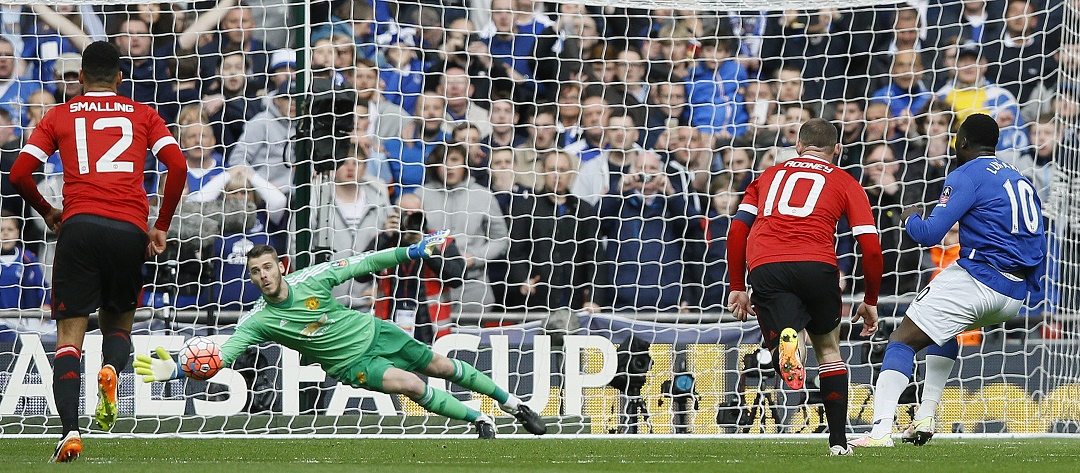
Intriguingly, there is actually some evidence to suggest that left-footed penalty takers miss more often. In the Champions League between 2007 and 2014, right-footed players were successful with 78% of penalties, left-footers with only 63%. Another survey in 2010 – based on a range of top-level matches on the domestic, European and international stages – showed that right-footers were successful with 69% of spot kicks compared to just 50% for left-footers.
On this occasion, facing David de Gea probably didn't help. The Spaniard was the only Manchester United player named in the PFA Premier League Team of the Year, largely because he has saved Van Gaal's men time and again this season.
"Yesterday we practised our penalties," the United boss said with a wry smile after this game. "Twenty penalties, Sergio Romero stopped one, David de Gea none. But today was the most important."
3. Martial shows he can deliver in key moments
Roberto Martinez's decision to go into this game with Muhamed Besic at right-back looked a risky one from the start. Everton had lost Seamus Coleman to injury last week, and they were then thrashed 4-0 at Liverpool in midweek with Bryan Oviedo filling in.
Besic is an experienced pro who has lined up for Bosnia at a World Cup, but he isn't a right-back and it was always going to show against Anthony Martial. The Frenchman was a constant threat throughout the match, causing huge problems cutting in from the left.
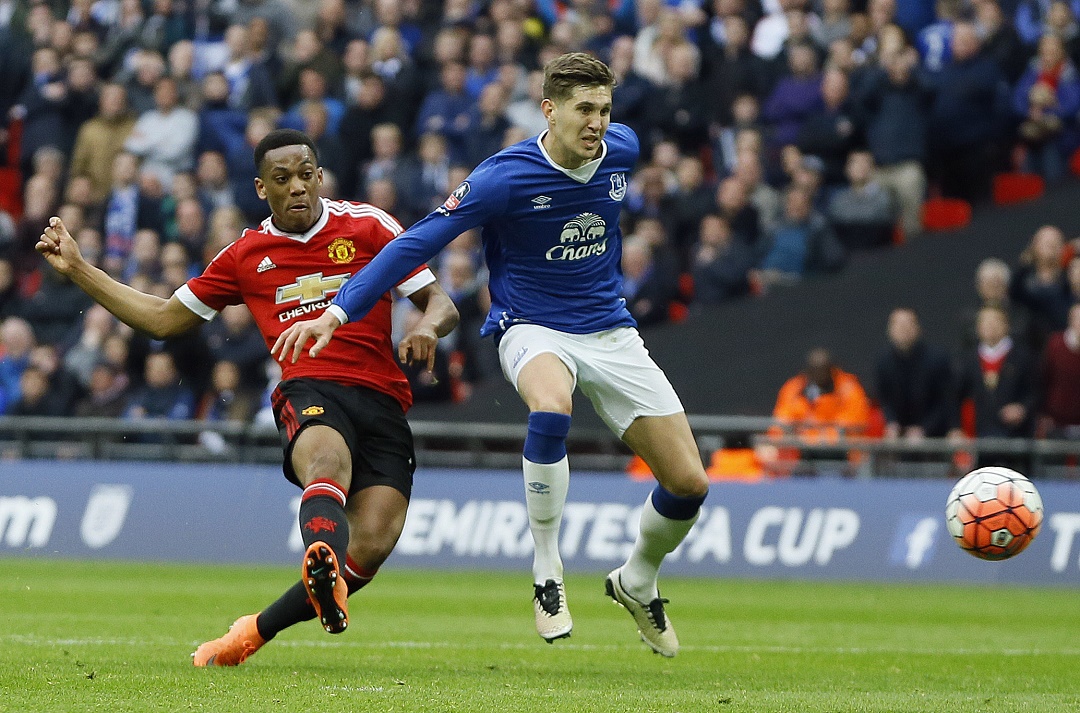
It was Martial who darted past Besic to the byline to set up Marouane Fellaini's opening goal, and there seemed little doubt that he would score when the ball fell his way in injury time. The Henry-esque finish was delivered with typical calm.
Many said that United had paid too much when they spent £36m, rising to £58m, to lure Martial from Monaco at the start of the season. But not only has the 20-year-old proved this season just how much talent he possesses, he has also now proved that he can deliver at the crucial moment.
4. Fellaini justified his selection over Schneiderlin
There seemed little doubt that he would score when the ball fell his way in injury time
Everton fans didn't take too kindly to the decision of broadcasting an interview with Fellaini live over Wembley's PA system post-match. It was met with boos for a player who left Goodison Park for Old Trafford three years ago, but the Belgian was another who played a key role for United.
Van Gaal's decision to leave out Morgan Schneiderlin was surprising for one major reason – United win much more frequently with the Frenchman than without him. In total this season they have won 19, drawn eight and lost only five of the 32 games that the ex-Southampton man has started. When he hasn't, they've won eight, drawn four and lost nine.
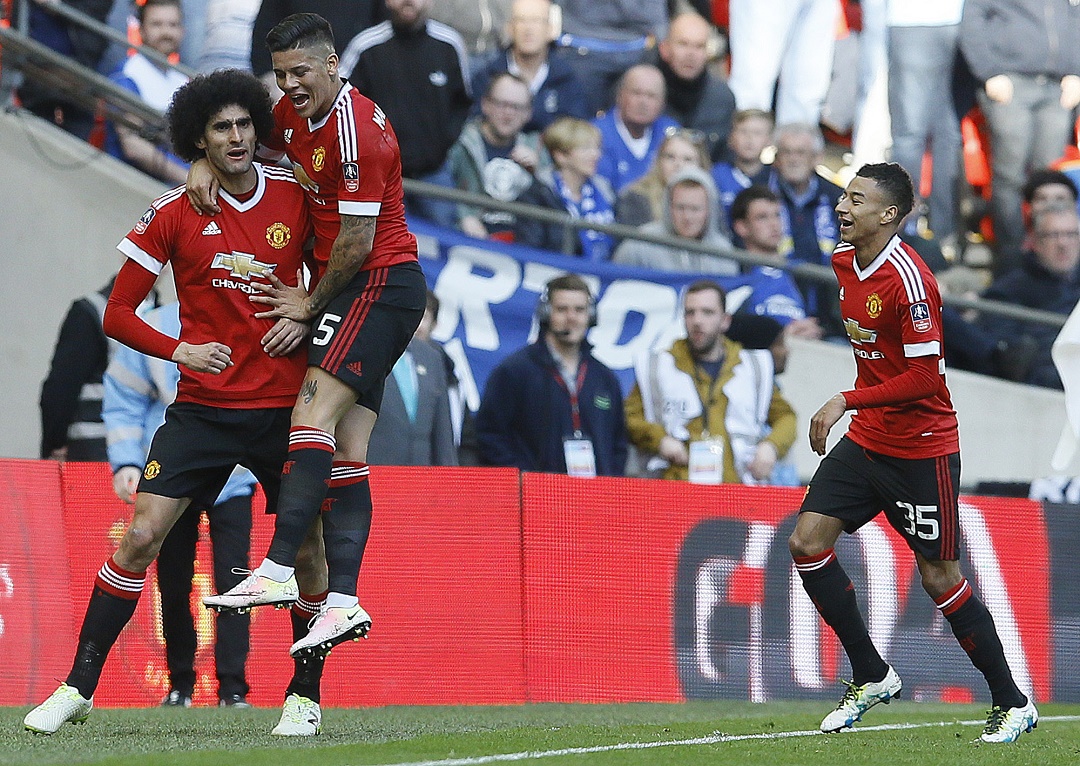
But Fellaini started ahead of Schneiderlin in the quarter-final replay win at West Ham, netting United's second goal in that game, and he scored again here. Everton couldn't handle the Belgian's physical presence and Fellaini won several headers in the Toffees' penalty area.
In the end Van Gaal was right. Fellaini offered an attacking threat that Schneiderlin doesn't possess.
5. Rojo struggled against Deulofeu... again
Deulofeu was afforded an acre of space by United's left-back to deliver the cross that led to Chris Smalling's own goal
Manchester United may have kept a clean sheet in their Premier League win over Everton at Old Trafford three weeks ago, but Marcos Rojo didn't have a good day against Spanish winger Gerard Deulofeu.
He must have been delighted, then, to see Deulofeu only named on the bench for this FA Cup semi-final. Rojo coped reasonably well defensively in the first half at Wembley against Aaron Lennon, also getting forward well to help Martial.
Everton were below par in the first half but the game changed after the interval. "It took 45 minutes to get into our own rhythm," Roberto Martinez said afterwards. "In the first half couldn't get into the areas we wanted to get into to dictate the play. But in the second half we built an incredible tempo, a great intensity."
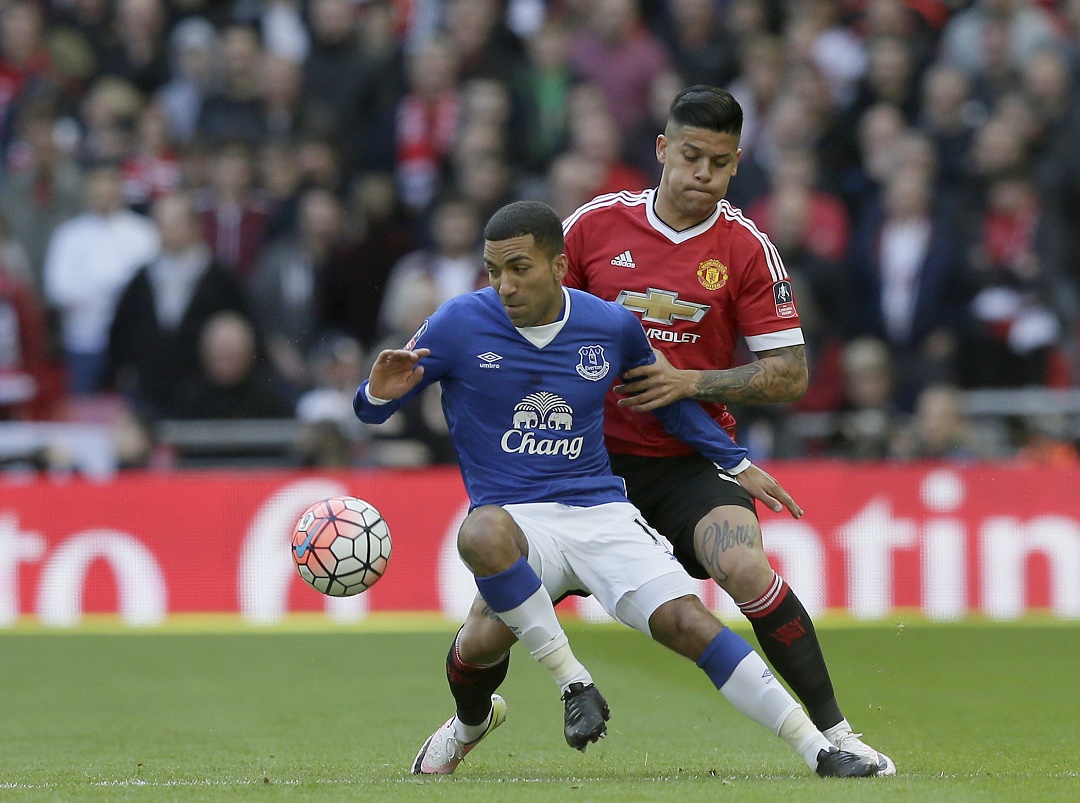
As Everton started to get on top, so too things unravelled for Rojo. Lennon started to make more of an impact and when Martinez replaced the former Spurs winger with Deulofeu, Rojo's problems got even worse.
Deulofeu was afforded an acre of space by United's left-back to deliver the cross that led to Chris Smalling's own goal. The former Barcelona man also saw a shot saved by De Gea and set up Lukaku for a chance, as his pace and dribbling skills caused Rojo and United all sorts of issues.
In the end, it didn't cost Van Gaal's men. But Rojo remains a potential weak link in the United defence.

Chris joined FourFourTwo in 2015 and has reported from 20 countries, in places as varied as Jerusalem and the Arctic Circle. He's interviewed Pele, Zlatan and Santa Claus (it's a long story), as well as covering the World Cup, Euro 2020 and the Clasico. He previously spent 10 years as a newspaper journalist, and completed the 92 in 2017.
